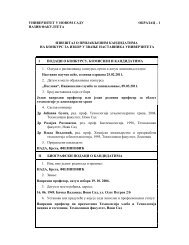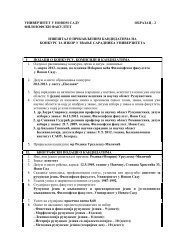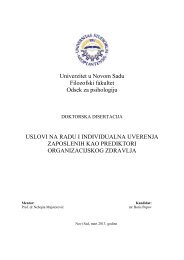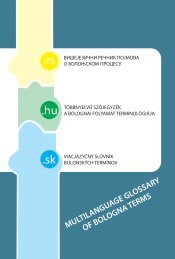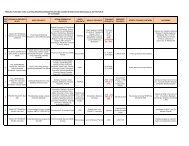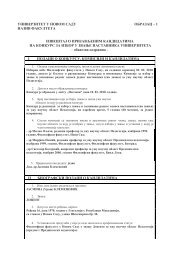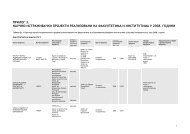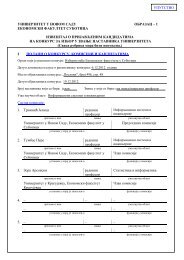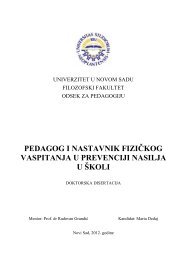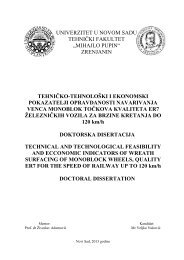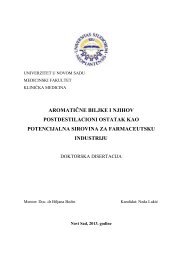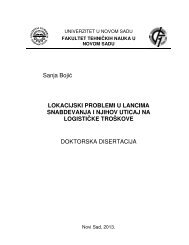Intercultural competence as an aspect of the communicative ...
Intercultural competence as an aspect of the communicative ...
Intercultural competence as an aspect of the communicative ...
Create successful ePaper yourself
Turn your PDF publications into a flip-book with our unique Google optimized e-Paper software.
which represents a degree <strong>of</strong> complexity <strong>of</strong> one’s view on <strong>the</strong> import<strong>an</strong>ce <strong>of</strong> cultural<br />
context in judging what is import<strong>an</strong>t to know <strong>an</strong>d value, <strong>an</strong>d Knowing – a degree <strong>of</strong><br />
underst<strong>an</strong>ding <strong>an</strong>d awareness <strong>of</strong> various cultures <strong>an</strong>d <strong>the</strong>ir impact on our global society<br />
<strong>an</strong>d level <strong>of</strong> pr<strong>of</strong>iciency in more th<strong>an</strong> one l<strong>an</strong>guage. For <strong>the</strong> intrapersonal domain <strong>the</strong>re<br />
are Identity – a level <strong>of</strong> awareness <strong>of</strong> one’s unique identity <strong>an</strong>d degree <strong>of</strong> accept<strong>an</strong>ce <strong>of</strong><br />
one’s ethnic, racial, <strong>an</strong>d gender dimensions, <strong>an</strong>d Affect – a level <strong>of</strong> respect for <strong>an</strong>d<br />
accept<strong>an</strong>ce <strong>of</strong> cultural perspectives different from one’s own <strong>an</strong>d degree <strong>of</strong> emotional<br />
confidence when living in complex situations. Thirdly, <strong>the</strong> interpersonal domain consists<br />
<strong>of</strong> Social Responsibility – a level <strong>of</strong> interdependence <strong>an</strong>d social concern for o<strong>the</strong>rs, <strong>an</strong>d<br />
Social Interactions – a degree <strong>of</strong> engagement with o<strong>the</strong>rs who are different from oneself<br />
<strong>an</strong>d <strong>the</strong> level <strong>of</strong> sensitivity. Finally, two additional domains are Well Being <strong>an</strong>d Global<br />
Citizenship. The first one consists <strong>of</strong> items that mostly relate to one’s own import<strong>an</strong>ce <strong>an</strong>d<br />
affirmative st<strong>an</strong>d, while <strong>the</strong> latter domain consists <strong>of</strong> items that mostly correlate with <strong>the</strong><br />
ide<strong>as</strong> <strong>of</strong> ‘global citizenship’. These domains do not include new questions but are<br />
comprised <strong>of</strong> <strong>the</strong> questions included in o<strong>the</strong>r subdomains. The grouping <strong>of</strong> <strong>the</strong> questions<br />
into (sub)domains is given in Appendix 5.<br />
The <strong>the</strong>ory behind <strong>the</strong> Inventory is in keeping with <strong>the</strong> more recent models <strong>of</strong><br />
culture discussed here – those which see culture <strong>as</strong> more dynamic <strong>an</strong>d variable, where<br />
‘me<strong>an</strong>ing is continuously being constructed through hum<strong>an</strong> interaction <strong>an</strong>d<br />
communication’ (Paige et al. 2003: 176).<br />
The questionnaire h<strong>as</strong> gone through several versions from 2007 when it w<strong>as</strong> first<br />
administered. The 2010 version includes a section on student life, with a focus on<br />
community, curriculum <strong>an</strong>d co-curriculum. This l<strong>as</strong>t intervention w<strong>as</strong> done with <strong>an</strong><br />
intention <strong>of</strong> facilitating discussions on what c<strong>an</strong> be done in terms <strong>of</strong> actions, programs or<br />
courses to improve <strong>the</strong> progress students are making in becoming global citizens <strong>an</strong>d<br />
developing global perspectives. However, for <strong>the</strong> purpose <strong>of</strong> this study, this section w<strong>as</strong><br />
not included in <strong>the</strong> questionnaire <strong>as</strong> it focused on <strong>the</strong> sociocultural characteristics <strong>of</strong> a<br />
college campus which w<strong>as</strong> not applicable to our setting.<br />
For this study <strong>the</strong> questionnaire w<strong>as</strong> tr<strong>an</strong>slated into Serbi<strong>an</strong> to avoid <strong>an</strong>y<br />
misunderst<strong>an</strong>ding <strong>an</strong>d possible l<strong>an</strong>guage problems for <strong>the</strong> large number <strong>of</strong> particip<strong>an</strong>ts<br />
with a wide r<strong>an</strong>ge <strong>of</strong> English l<strong>an</strong>guage pr<strong>of</strong>iciency. Also, this part focused on ICC <strong>as</strong> <strong>the</strong><br />
particip<strong>an</strong>ts drew on <strong>the</strong>ir knowledge <strong>of</strong> <strong>an</strong>d interest in o<strong>the</strong>r cultures, so no direct ICCC<br />
w<strong>as</strong> expected, which w<strong>as</strong> <strong>an</strong>o<strong>the</strong>r re<strong>as</strong>on for <strong>the</strong> tr<strong>an</strong>slation.<br />
133



